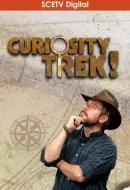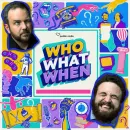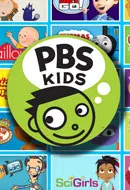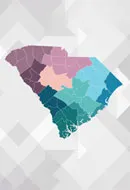
Starting off the Summer of Nostalgia, we will present five programs from the series, Jump Over the Moon (1981).
"Books can introduce children to nearly all aspects of life, from the important to the frivolous. Books, especially picture books designed for small children, will be the focus of this series of programs."
-Rick Sebak, Producer for South Carolina ETV (1981)
Give Us Books (1981)
This episode focuses on explaining what the “Jump Over the Moon” series will cover. In the first segment of the episode, it focuses on children and their treatment in different cultures over the years. In the second segment, it focuses on the history of children’s literature and picture books, as well as their importance.
Raphael and Bolognese (1981)
This episode focuses on the work of Don Bolognese and Elaine Raphael, and what goes into it. Rick Sebak interviews them and asks them what got them started in creating children’s books, and what the process is like. They explain that they collaborate constantly with each other, as well as with their editor. Bolognese explains the importance of illustrations and how they can elevate a book.
Mother Goose Rhymes (1981)
This episode focuses on the history of mother goose rhymes and their various interpretations. It discusses the long history of mother goose rhymes, as well as nursery rhymes. It also dives into the different types of mother goose rhymes, which include anthologies, single rhymes, thematic collections, and variants. It also goes into detail about the many interpretations of mother goose rhymes.
Information Books (1981)
This episode explores information books, which present various concepts/topics to readers. Rick Sebak covers a variety of information books, such as animals, biographies, sports, and cookbooks. Sebak explains that clear and concise wording is important when writing an information book. He also explains that they can help inspire children but can still be a useful tool to anyone of any age.
Counting Books (1981)
This episode explores various counting books, along with a critique of each one. Rick Sebak states that there are three kinds of counting books, which are: potpourri, related examples, and sequential story. Potpourri is defined as “a miscellaneous collection.” Sebak also discusses critiques of some counting books and their effectiveness in teaching young children how to count.
More to Come!
These programs will be added next summer for your enjoyment!
Concept Books (1981)
This episode explores concept books that cover a variety of basic, common concepts. The concepts include shapes, colors, sounds, weather, and emotions. Some concept books are also game-like, which means that they challenge users by making them think and discover things, rather than telling/showing them. The narrator, Rick Sebak, also explains the importance of introducing concept books to children early on.
Alphabet Books (1981)
This episode explores various alphabet books and what makes an alphabet book effective. Rick Sebak explains that the purpose of alphabet books is to teach the sequence, form, and style of letters. He also explains how alphabet books can help develop three basic literacy skills for children, which are: the ability to describe, the ability to compare, and the ability to value.
Wordless Books (1981)
This episode discusses wordless books, which are books filled with pictures rather than words. Rick Sebak explores a variety of wordless books, ranging from the most popular all the way to those with some controversy. He also explains two criteria for evaluating wordless books, which are: picture quality and story quality.
Contemporary Realism (1982)
This episode covers contemporary realism books, which explore events that can occur in real life. Real life events can range anywhere from meeting new people to having a terrible day. These books can help children understand emotions, situations, and how to deal with them. Rick Sebak explains that not all of these books are for all ages, and that some of them may be difficult for younger children to comprehend.
Folktales #1 (1981)
This episode explores folktales, which are popular culture stories passed on through the years. These stories are typically passed on by word of mouth. Rick Sebak explains that there are three basic elements to folktales, which are: simple language, simple plot, and simple characters. He also explains that there are two primary types of folktales: simple tales and complex tales.
Folktales #2 (1981)
This episode explores folktales, more specifically fairytales, literary tales, and tall tales. Rick Sebak also covers folktales/fairytales from other cultures and regions around the world. He also talks about how some folktales from very different cultures/regions have very strong similarities. Tall tales are also covered in this episode, such as “Paul Bunyan” and “Johnny Appleseed”.
Storytelling: Augusta Baker (1981)
This episode focuses on an interview between Augusta Baker and Rick Sebak. Augusta Baker was a librarian and storyteller who is known for her work in children’s literature. Throughout the episode, Rick asks her questions about what inspires her and how she approaches storytelling. When she goes to an event, she finds it important to know her audience so that she knows what stories are appropriate.
Share: Picture Books (1981)
This episode focuses on an interview with Augusta Baker, a prolific author and storyteller. Rick Sebak sits down with Augusta Baker as they discuss storytelling with picture books, and how it is different than regular storytelling. Since picture books are catered towards very young children, you must have a different approach with your storytelling than you would with middle-aged children.
Poetry (1981)
This episode explores poetry, the different types of poetry, and various published works. The narrator, Rick Sebak, explains the different types of poetry, which are: narrative, lyric, and nonsense. He also dives into a variety of published poems, as well as some of their various versions. For example, “A Visit from St. Nicholas” by Clement Moore, has had a variety of versions since originally being published in 1822.
Memorable Characters (1981)
Coming soon!
SIDE NOTES
Learn more about series producer Rick Sebak's career at WQED Pittsburgh here.






